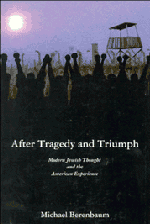Introduction
Published online by Cambridge University Press: 06 January 2010
Summary
These essays, written over the past several years, address three central issues: the identity of Jews after the tragedy of the Holocaust and the triumph of Israel, the tensions created within Jewish tradition between a history of victimization and the assumption of power, and the choices facing free Jewish communities in the wake of decreased antisemitism. After the Holocaust, Jews recast their role in history, assuming political power and linking religious survival with the fate of a secular state.
Unlike their European ancestors, American Jews live in freedom, outside physical or intellectual ghettos. Jews can no longer speak one way to the community and another to those beyond the circle of faith. Jewish intellectuals enjoy the liberty and self-confidence to ask painful questions and face the consequences. At home in American society, American Jews – committed to their religious and ethnic heritage – are wrestling with the twin revolutions of modern Jewish experience, which are seemingly antithetical.
Two critical European philosophers, Friedrich Nietzsche and Jean-Paul Sartre, voiced questions about Jewish history that today's generation may answer. Is Judaism the religion of the powerless? Would an empowered community manifest the same empathy and justice for the oppressed? Would an ethic formed in the absence of power instruct a powerful polity? Sartre asked whether the antisemite made the Jew.
American Jewry is now in its fifth generation. The massive immigrations that began in 1881 changed the composition of the community from a small Sephardic and German settlement into a much larger Jewish population, primarily of Eastern European origin. A century later, American Jews are no longer immigrants or the children of immigrants.
- Type
- Chapter
- Information
- After Tragedy and TriumphEssays in Modern Jewish Thought and the American Experience, pp. xvii - xxiiPublisher: Cambridge University PressPrint publication year: 1990

